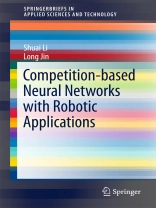Focused on solving competition-based problems, this book designs, proposes, develops, analyzes and simulates various neural network models depicted in centralized and distributed manners. Specifically, it defines four different classes of centralized models for investigating the resultant competition in a group of multiple agents. With regard to distributed competition with limited communication among agents, the book presents the first distributed WTA (Winners Take All) protocol, which it subsequently extends to the distributed coordination control of multiple robots.
Illustrations, tables, and various simulative examples, as well as a healthy mix of plain and professional language, are used to explain the concepts and complex principles involved. Thus, the book provides readers in neurocomputing and robotics with a deeper understanding of the neural network approach to competition-based problem-solving, offers them an accessible introduction to modeling technology and the distributed coordination control of redundant robots, and equips them to use these technologies and approaches to solve concrete scientific and engineering problems.
Table des matières
Competition Aided with Discrete.- Time Dynamic Feedback.- Competition Aided with Continuous.- Time Nonlinear Model.- Competition Aided with Finite.- time Neural Network.- Competition based on Selective Positive-negative Feedback.- Distributed Competition in Dynamic Networks.- Competition-based Distributed Coordination Control of Robots.












